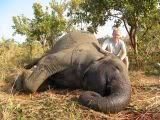

 The Accurate Reloading Forums
The Accurate Reloading Forums  THE ACCURATE RELOADING.COM FORUMS
THE ACCURATE RELOADING.COM FORUMS  Hunting
Hunting  African Big Game Hunting
African Big Game Hunting  Zimbabwe: Poaching out of Control
Zimbabwe: Poaching out of ControlGo  | New  | Find  | Notify  | Tools  | Reply  |  |
| One of Us |
From the Hunt Network The true scale of poaching in Zimbabwe is now impossible to gauge. But environmentalists are agreed; killing is widespread, indiscriminate and out of control. The World Wildlife Fund estimates up to 80 per cent of wildlife on reclaimed farms has been slaughtered since 2001, with little sign of the desire for bush meat and cash abating. Now poaching is deep into 'protected' state and privately-owned nature reserves and both endangered and common species are treated as prey. "They are killing everything and anything from a squirrel to an elephant," says Karen Paolillo, "For food and for money." British-born Karen and her French husband Jean have dedicated some 17 years to protecting hippos and other animals on the Turgwe River, in the privately-owned Save Valley Conservancy, in the southeast Lowveld. But with settlements of hundreds of families now flanking their small, self-dubbed 'Hippo Haven' on two sides, the couple are seeing the wildlife vanishing. Poachers' preferred targets are antelope, wildebeest and zebra, but they also kill lion, elephant, rhino, leopard, buffalo, and giraffe. Some are hacked for their most valuable parts, some are left to bleed to death, or die of gangrene. Often the surrounding air stinks of rotting flesh. advertisementImmediately after the Conservancy lands were occupied around Karen and Jean's haven, four of its hippos disappeared. Although with negotiating and the help of two armed safari patrol officers they have managed to prevent any further hippo poaching, the slaughter of other animals is relentless and the hippos remain at risk. In a country of empty shops and spiralling inflation, a hippo yielding a ton of meat, is a tempting prospect. Especially when coupled with tusk-like teeth which can be sold as an elephant ivory alternative. Many now fear Zimbabwe will follow the pattern of the Democratic Republic of Congo, which has seen its hippos reduced from 229,000 to a mere estimated 800 in three troubled decades. Hippos are classified 'vulnerable' under CITES, the international convention on endangered species. Karen estimates in the last six years she has recovered some 4,000 wire snares and found around 3,500 dead animals from the area she patrols. The Zimbabwe Conservation Task Force says if the killing continues at this rate by 2013 there will be no wildlife left nationwide. Yet Karen who first came to Zimbabwe aged 22 in 1977, fired by the film 'Born Free,' remains philosophical. "There will always be poaching. I have no problem with subsistence poaching, the odd poacher who 'deserves' to poach, through hunger. But this is about the bush meat trade and money. It is not sustainable." Also caught in the massacre are scores of rare black rhino - prized for their horns which can fetch up to £60,000 - a lot of money in a country when the average fine for poaching is around £4. "It's shocking but not surprising. If a bank gets raided and there's bank notes lying around on the ground, will people just pick them up?" Karen and Jean have faced AK47 and shotgun-toting poachers and experienced a terrifying stand-off with a longbow-wielding raider. The couple have been threatened with having their house burned to the ground and Jean falsely accused of murder. "Arrests and convictions for poachers are rare, fines limited and sentences are non-existent. At most they are kept overnight and have to walk back from the police station, it's a minor inconvenience," explains Karen. "But these things happen when countries have difficult times - people and animals suffer." All this must seem a long way from Woburn Abbey's 'Pet's Corner' in leafy Bedfordshire where Karen's mother worked tending rabbits, guinea pigs and the odd lama. Her mother and her veterinarian father were the inspiration behind her work with animals. Now her geologist husband has given up his work to aid her in her work. The bush, she says, was never considered the easiest place for a petite, 5ft 4ins blonde English woman - but is now too dangerous alone. "I would be dead without his protection," she says bluntly. Negotiations over the Conservancy settlers with the government, environmentalists and landowners are ongoing. And despite the fact the talks started six years ago, Karen is optimistic. She thinks, as in Kenya, saving wildlife for tourism is the key, especially in the reserve where crops and cattle ranching has failed for both white and black farmers and water is becoming a point of conflict between humans and animals. "The wildlife is the only thing that should naturally be in this area," she says. "I love Zim, I love Zimbabwean people and I believe in Zimbabwe. We need stability for tourists to return to Zimbabwe, and the wildlife is the reason they will come." http://www.telegraph.co.uk/earth/main.jhtml?xml=/earth/...07/10/eahippo110.xml Seloushunter Nec Timor Nec Temeritas | ||
|
| One of Us |
I hope that's not a suggestion that Kenya's solution to protecting its wildlife over the last 30 years has been successful. Any answer for Zim will HAVE to include sport hunting for revenue and sustainable use by everyone. | |||
|
| one of us |
Agreed on the Kenya comment. In my recent trip to Makuti, I saw no signs of poaching. _______________________________  | |||
|
| Powered by Social Strata |
| Please Wait. Your request is being processed... |
|
 The Accurate Reloading Forums
The Accurate Reloading Forums  THE ACCURATE RELOADING.COM FORUMS
THE ACCURATE RELOADING.COM FORUMS  Hunting
Hunting  African Big Game Hunting
African Big Game Hunting  Zimbabwe: Poaching out of Control
Zimbabwe: Poaching out of Control

Visit our on-line store for AR Memorabilia

